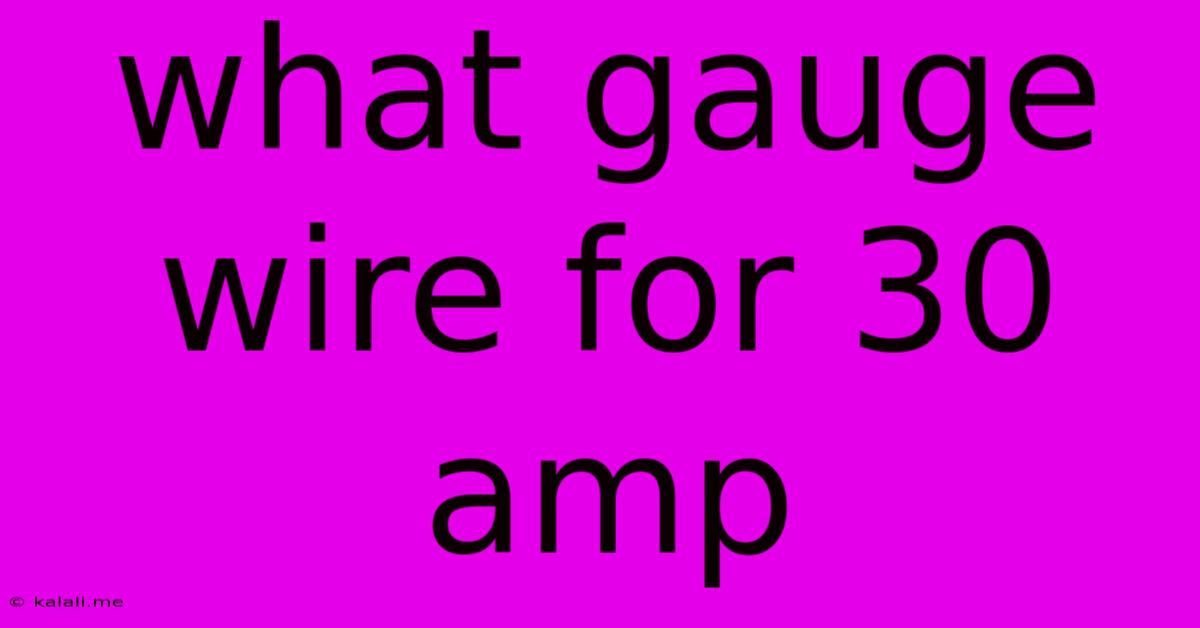What Gauge Wire For 30 Amp
Kalali
May 24, 2025 · 3 min read

Table of Contents
What Gauge Wire for 30 Amps? A Comprehensive Guide
Choosing the right gauge wire for a 30-amp circuit is crucial for safety and proper electrical function. Using wire that's too thin can lead to overheating, potential fire hazards, and circuit breaker tripping, while using wire that's too thick is unnecessarily expensive. This guide will help you understand how to determine the correct wire gauge for your 30-amp application. We'll cover the key factors, relevant codes, and practical considerations.
Understanding Wire Gauge and Ampacity
Wire gauge refers to the diameter of the wire. The lower the gauge number, the thicker the wire. Ampacity is the maximum current a wire can safely carry without overheating. The National Electrical Code (NEC) dictates minimum wire sizes for various applications based on ampacity. For a 30-amp circuit, you need a wire gauge that can handle at least 30 amps continuously without exceeding its temperature rating.
Factors Affecting Wire Gauge Selection:
Several factors influence the appropriate wire gauge choice beyond the amperage:
- Wire Material: Copper and aluminum are common materials. Copper has higher conductivity, meaning it can carry more current for the same gauge. Aluminum is lighter and cheaper but requires larger gauge sizes for the same current capacity. Always check the ampacity rating for your specific wire material.
- Installation Location: Wire installed in conduit, walls, or underground will experience different heat dissipation properties compared to wire run in open air. This affects the ampacity rating. The NEC provides specific guidance for these installations.
- Ambient Temperature: Higher ambient temperatures can reduce the ampacity rating of a wire. The NEC considers this factor in its tables.
- Length of Run: Longer runs of wire experience more voltage drop, requiring potentially larger gauge wire to compensate and maintain sufficient voltage at the load.
Determining the Correct Gauge: NEC Tables and Calculations
The NEC's Chapter 9, Table 310.15(B)(16) provides ampacity ratings for different wire types, sizes, and installation methods. Consulting this table, along with your specific installation conditions, is essential. For a 30-amp circuit, you would look for a wire with an ampacity rating equal to or greater than 30 amps under your particular installation circumstances. Often, a 10 AWG copper wire is appropriate for this.
Important Considerations:
- Circuit Breaker Protection: The circuit breaker protects the wiring and connected equipment from overcurrent. Ensure the circuit breaker's rating matches the wire's ampacity. A 30-amp circuit should use a 30-amp breaker.
- Connector and Terminal Size: The wire connectors and terminals must be rated for the amperage and wire gauge being used. Improper connections can create resistance and cause overheating.
- Local Codes: Always check your local electrical codes, which may have stricter requirements than the NEC.
- Professional Advice: If you're unsure about any aspect of wiring, always consult a qualified electrician. Electrical work can be dangerous and should only be performed by trained professionals.
In Conclusion:
While a 10 AWG copper wire is often suitable for a 30-amp circuit, you must consult the NEC tables and consider the factors mentioned above to determine the correct wire gauge for your specific project. Safety should always be the top priority. Never compromise on the appropriate wire size to avoid potential hazards. Selecting the right gauge wire ensures a safe and efficient electrical system.
Latest Posts
Latest Posts
-
Can You Go From Synthetic Oil To Regular
May 24, 2025
-
Can I Open A 529 Plan For My Nephew
May 24, 2025
-
Why Does My Cat Want To Be Dirty
May 24, 2025
-
How To Ask For Relocation Assistance
May 24, 2025
-
Do Insurance Companies Report To Carfax
May 24, 2025
Related Post
Thank you for visiting our website which covers about What Gauge Wire For 30 Amp . We hope the information provided has been useful to you. Feel free to contact us if you have any questions or need further assistance. See you next time and don't miss to bookmark.